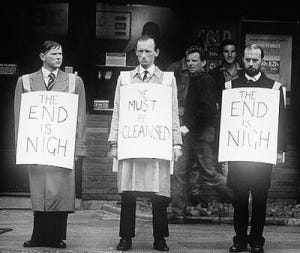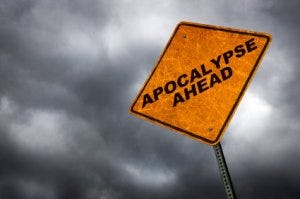Preparing for the Apocalypse?

Federal Reserve policy must seem pretty arcane to most people, which is why I try to liven it up with a bit of sarcasm and wit. There was a lead article in this week's Barrons illustrating how the public equity markets are shrinking (instead of the Wilshire 5000, it's now the Wilshire 3666). Here is the lead-in:
As companies find other ways to raise cash, number of U.S. stocks keeps shrinking.
The writer then summarizes an explanation:
Why has the universe of investible U.S. stocks shriveled so? Globalization, porous borders, and the rise of foreign markets have siphoned away a few U.S. listings. Mergers and bankruptcies have exacted a toll. Increased regulation and the climbing costs of a public listing have weakened the resolve of managers who once dreamt of ringing the opening bell at the New York Stock Exchange. At the same time, zealous private-equity buyers and zero interest rates are making it all too easy for companies to raise money without going through the pantomime of public compliance.
This should really surprise no one who's aware of the impact Fed policy has upon the structure of our economy. Think about it: you start a business with a little capital saved up. If you're successful and your business grows you need more and more capital, either from the bank, from venture capitalists, private equity firms, or public equity and credit markets (by issuing stocks and bonds). The costs of these different financing options varies. Borrowing at a reasonable or low rate allows one to retain the equity and leverage the profits and value of the enterprise. (This is how one gets into the 1%)
However, if borrowing is dear, growing firms will use public equity markets to spread risk and give up a proportionate amount of return. But Fed policy over the past 20 years has essentially assured business owners that monetary policy will serve to prop up business and equity values with limitless liquidity. That's what the Fed's Zero Interest Rate Policy does by keeping interest rates low. (Quantitative easing buys up bad mortgages from the banks so they can get back into the business of making loans, but who wants to make loans when you can make risk-free returns by buying Treasuries and lending to the government?)
So where's the risk and the imperative to give up equity profits to share that risk? Essentially, the Fed has given businesses and speculators free insurance and leveraged them up with cheap credit. The taxpayers provide the guarantees by absorbing any losses with bailouts.
So, as the article explains, we see private equity and share buybacks shrinking the participation of the public in the profits of capitalism. Why give up equity if there is no risk? It is my opinion that Fed policy is accelerating the imbalances in our market society to unsustainable levels. And the politicians merely think the headline numbers show what a great job they're doing. The Obama administration is touting the bubbling stock market as proof of how great their policies are working for America. Really? They should think about this: a permanent zero or negative real interest rate essentially means There. Is. No. Tomorrow. Great, shall we call it the Apocalypse policy?




